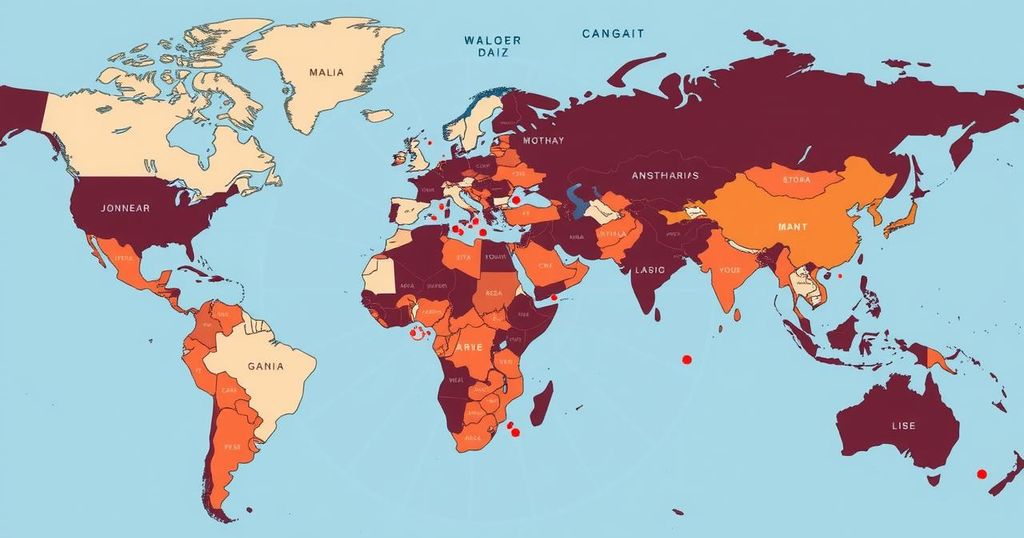The UK Foreign, Commonwealth & Development Office issued a travel advisory on December 7, 2024, designating 68 countries as unsafe for travel due to risks such as political instability and conflict. This includes warnings for regions that pose significant security threats, emphasizing the importance of staying informed and prioritizing safety in travel decisions. The advisory impacts the travel industry significantly, encouraging adjustments in services to enhance safety measures for travelers.
On December 7, 2024, the UK Foreign, Commonwealth & Development Office (FCDO) released a comprehensive travel advisory, identifying 68 countries and territories as unsafe for travel. This advisory includes categorizations of regions into “do not travel” and “all but essential travel” zones due to various ongoing threats such as political instability, conflict, and health risks. The FCDO’s aim is to protect British nationals while emphasizing the importance of verifying travel advice prior to departure. Such warnings carry substantial implications for the travel industry, affecting tourism and travel insurance while necessitating careful itinerary planning.
Escalating security threats particularly in conflict zones have prompted the FCDO to warn against travel to specific regions. The volatile situation in the Middle East, highlighted by the ongoing hostilities between Israel and Lebanon, is a primary concern. With recent military actions and missile strikes in the area, coupled with Iran’s involvement, the risk levels have surged. Travelers are encouraged to stay informed through regular updates from the FCDO and news sources, as conditions may change swiftly.
The advisory identifies several countries where security risks are pronounced, including Afghanistan, Belarus, Yemen, and Sudan. Travelers heading to these regions must navigate unpredictable security conditions influenced by conflict and civil unrest. Similarly, certain areas in Algeria, Ethiopia, and Myanmar are cited as unsafe due to proximity to conflict zones or active insurgencies.
For locations deemed to require essential travel only, it is imperative for travelers to evaluate their personal circumstances and potential risks. Decisions regarding essential travel should be grounded in individual assessments of necessity against the backdrop of current dangers.
The FCDO’s travel advisories pose significant challenges for the travel industry, particularly for those destinations that rely heavily on tourism for their economies. To align with safety concerns and legal requirements, travel operators, airlines, and insurers are adjusting their services accordingly. On the other hand, travelers are reminded of the necessity for caution and prudent decision-making. While the FCDO’s guidance affects a significant number of countries, it simultaneously underscores the resilience within the global travel industry, which continues to support tourism in many safe destinations across Southeast Asia, the Americas, and Europe.
Ultimately, the FCDO’s latest travel restrictions highlight the need to remain aware of global security risks prior to undertaking travel. Both travelers and industry stakeholders must prioritize safety over convenience. In light of geopolitical tensions and environmental challenges, the need for adaptability remains crucial in navigating the complexities of international travel.
The travel advisory issued by the UK Foreign, Commonwealth & Development Office addresses growing concerns over global security threats that have made various countries unsafe for travel. The FCDO’s classification of regions into ‘do not travel’ and ‘all but essential travel’ stems from multifaceted issues such as political turmoil, ongoing conflicts, and serious health crises. As the global landscape faces volatility, these advisories are crucial for guiding British nationals in making informed travel decisions and emphasizing the necessity of consulting updated travel information.
In conclusion, the recent advisory from the UK Foreign, Commonwealth & Development Office emphasizes a need for vigilance among travelers regarding safety and security risks. With numerous countries classified as unsafe, the consequences extend beyond individuals to the travel industry as a whole. The necessity of informed decision-making is paramount as both the travel sector and individuals adapt to the realities presented by such widespread advisories, underscoring safety’s precedence over personal convenience in travel planning.
Original Source: www.travelandtourworld.com






